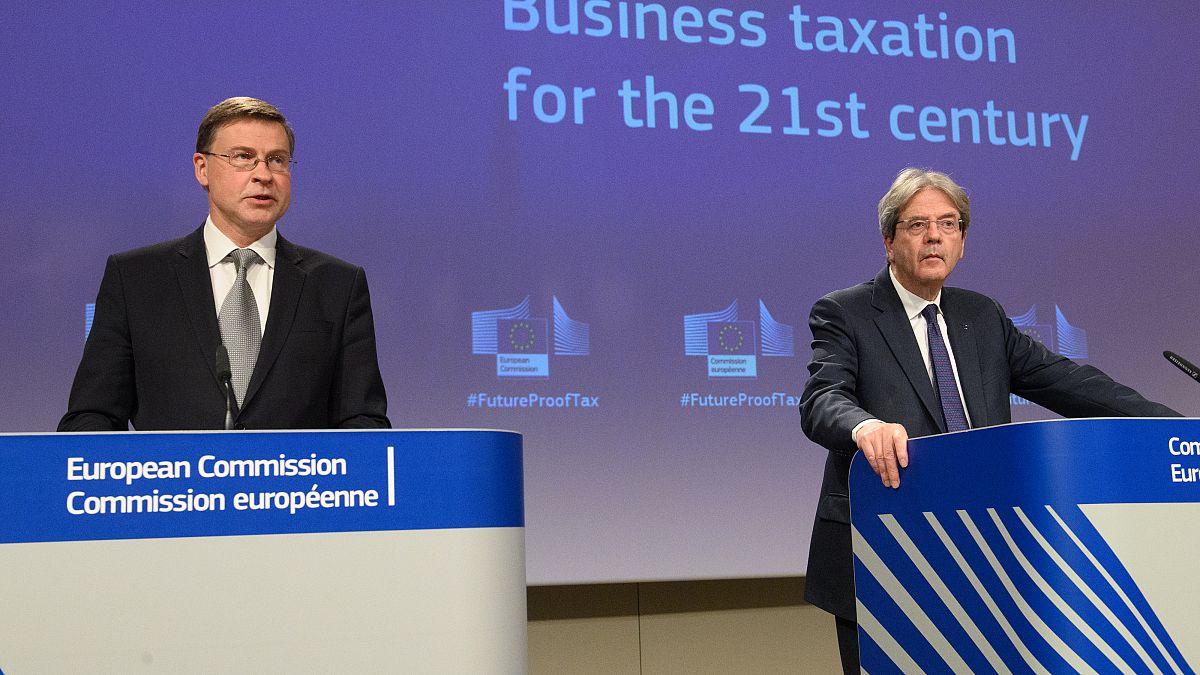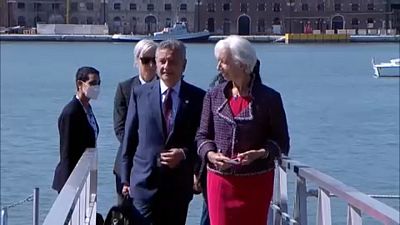G20 finance ministers are seeking an agreement on a minimum global corporate tax following years of negotiations in the OECD and a new push by US President Joe Biden.
The European Commission has unveiled a new tax agenda that aims to ensure EU countries are able to collect the necessary revenues to finance the post-coronavirus recovery as well as the twin green and digital transitions.
The presentation comes just weeks before a crucial meeting of G20 finance ministers in Venice where world powers will seek to reach a long-delayed agreement to reform the international corporate tax system, which many considered obsolete due to the transformations and challenges arising from the digital economy.
Both the EU's new tax agenda and the G20 negotiations are designed around the two-pillar framework of the Organisation for Economic Co-operation and Development (OECD).
The first OECD pillar is centred on the partial re-allocation of taxing rights to ensure that taxing profits is no longer exclusively determined by a company's physical presence. The second one is focused on establishing a minimum effective tax rate for the profits obtained by large multinationals, regardless of the country in which they are based.
Discussions inside the OECD have been going on for years but the devastating impact of the coronavirus pandemic and the rise in teleworking have created momentum for a successful conclusion.
Advanced economies have been pumping unprecedented levels of fiscal support that have resulted in a pronounced hike in public debt, which governments must gradually repaid. Increasing the tax rate for large corporations, many of which have seen their profits skyrocket during the pandemic, has emerged as one of the easiest and most immediate solutions to obtain revenues.
This sense of urgency has led US President Joe Biden to throw his support behind the global efforts to find a consensus around corporate tax, a process that previous American administrations have hindered. Biden is in need of funds to finance his ambitious $2.3 trillion infrastructure bill.
"We are working with G20 nations to agree to a global minimum corporate tax rate that can stop the race to the bottom," said US Secretary of Treasury Janet Yellen in early April. "Together we can use a global minimum tax to make sure the global economy thrives based on a more level playing field in the taxation of multinational corporations, and spurs innovation, growth, and prosperity."
Brussels has moved quickly to embrace America's U-turn and move ahead with its economic plans.
"It's time to rethink taxation in Europe," said Paolo Gentiloni, EU Commissioner for economy, on Wednesday afternoon while presenting the new tax agenda.
"The renewal of the transatlantic relationship offers an opportunity to make decisive progress towards a global tax reform. We must work to seize that opportunity, while ensuring that an international agreement protects Europe's key interests."
Gentiloni added that it might be possible to reach an "agreement in principle" when financial ministers from the G20 group meet in Venice in mid-July, but warned that the implementation and the details will take longer time to develop due to the complexity of the issue. The commissioner said that any agreement would be a "great success" compared to the situation half a year ago.
Once there's consensus on the two pillars proposed by the OECD, the European Commission will put forward legislative texts to ensure the application across the bloc. Not all EU member states are part of the G20 and the OECD.
What's in the new EU tax agenda?
The European Commission wants to make it easier for companies that operate in more than one member states to pay their taxes. Right now, cross-border business operations can face up to 27 different national tax systems, a daunting prospect that can deter small companies from scaling up.
Besides the ongoing fragmentation, the executive believes the current tax structures are obsolete because they don't reflect the new business reality created by digitalisation and globalisation.
"This creates high compliance costs for business and risks of double taxation. At the same time, some companies exploit loopholes between tax systems through aggressive tax planning strategies," the Commission notes.
According to Gentiloni, every year the EU loses €46 billion in tax evasion from individuals and between €35 and €70 billion in tax avoidance from companies.
With this in mind, Brussels has put forward short- and long-term solutions.
Short-term proposals include make large companies publish their effective tax rates to ensure transparency and clamp down the use of shell companies (legal entities with little economic activity that are usually used for tax avoidance and money laundering). The Commission also recommends that member states allow companies to move their losses registered during the pandemic to the previous fiscal year to offset the damage and obtain tax refunds.
The agenda's main element is a long-term tax framework that will be formally introduced sometime next year. Under the name "Business in Europe: Framework for Income Taxation" (BEFIT), the EU will put forward a common tax base for businesses and a single rulebook with the aim to cut red tape, foster investment and reduce tax avoidance.
In addition to this, the Commission will continue to push for a EU-wide tax on digital services, a controversial idea that some member states have opposed while others have already implemented at national level. A proposal is set to arrive in the coming months and will be designed to directly contribute to the EU's budget and the €750-billion recovery fund.
The new tax agenda will remain, for the time being, a simple policy paper. Any legislative proposal that arises from it will require the unanimity of the 27 EU countries, a condition that is far from guaranteed due to the long-standing divergences and disagreements on tax policy. Member states like Luxembourg, the Netherlands, Ireland and Malta have been accused of operating tax havens and are expected to challenge any plan that might threaten their business environment.
However, the emergency of the pandemic and the arrival of Joe Biden could make the EU come together and find common ground.
"This time it could be different for two main reasons. The first one is the economic crisis we are facing. And so the urgency situation that requires us to collect more public revenues. We cannot accept the aggressive tax competition amongst member states any more," Chiara Putaturo, inequality and tax policy advisor at Oxfam's EU Office, told Euronews.
"And the second [reason] are the tax reforms at the global level, because both the pillar one and the pillar two of the [OECD] tax negotiations can help in establishing this unitary taxation system."



